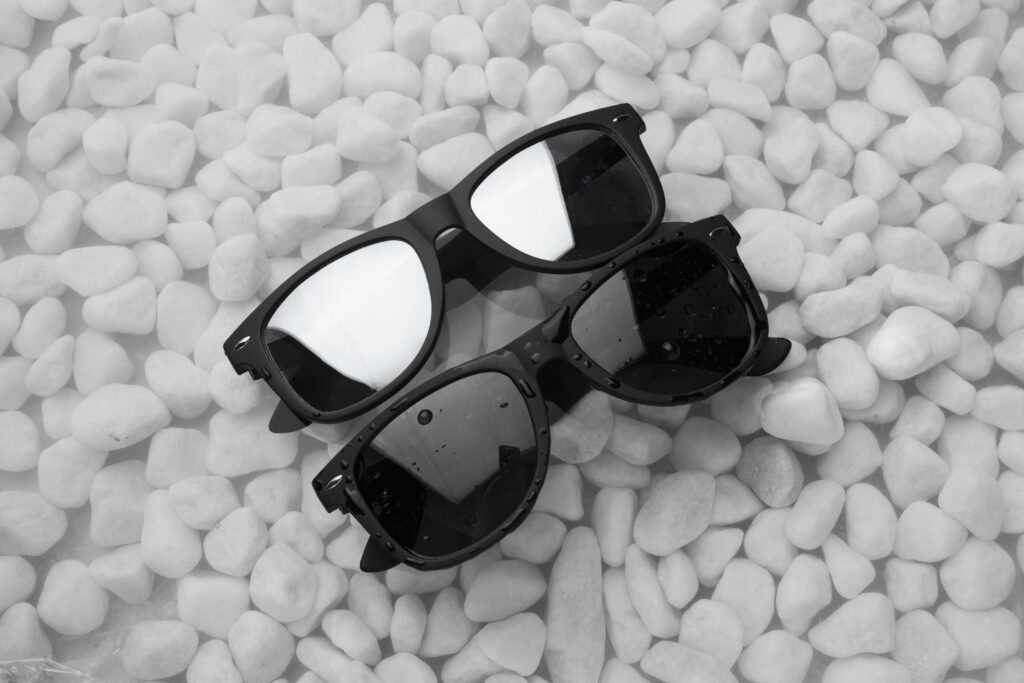UV vs. Polarized Lenses: Why You Need One, and Might Want the Other

On a bright summer day, putting on sunglasses feels like second nature. But not all sunglasses are created equal—and not all of them protect your eyes the way you think. Many people assume that if lenses are polarized, they automatically provide full UV protection. Unfortunately, that’s not always the case.
At OptiCare Health, we often meet patients who are surprised to learn that UV and polarization are two different features. Both have their place, but only one is essential for your eye health.
What Does UV Protection Actually Do?
Ultraviolet (UV) light is a form of radiation from the sun that’s invisible to the eye—but that doesn’t mean it’s harmless. Over time, exposure to UV rays can contribute to:
- Cataracts
- Macular degeneration
- Photokeratitis (essentially a sunburn on the cornea)
- Pinguecula and pterygium—growths on the surface of the eye
- Skin cancer on the eyelids or surrounding areas
UV damage is cumulative, meaning it adds up over time—even on cloudy days. That’s why UV protection should be non-negotiable when choosing sunglasses. Look for lenses labeled “UV400” or that explicitly state they block 100% UVA and UVB rays.
So What Are Polarized Lenses?
Polarized lenses are designed to reduce glare from reflective surfaces—like water, roads, snow, or car windshields. They work by filtering out horizontal light waves, which cause most of that blinding reflection that makes you squint.
Polarization can make a huge difference when:
- Driving on a sunny day
- Fishing, boating, or spending time near water
- Walking on bright concrete or sand
- Skiing or hiking in snowy terrain
The result is clearer contrast, less eye strain, and more comfortable vision in bright settings. But here’s the catch: polarization has nothing to do with UV protection.
Many polarized lenses do offer UV protection, but not all. And just because sunglasses reduce glare or look dark doesn’t mean they’re actually filtering harmful rays.
Why the Confusion?
It’s easy to see why people assume dark lenses = full protection. But some inexpensive sunglasses are simply tinted plastic. They may look stylish and reduce brightness, but if they don’t have proper UV filters, they can do more harm than good—because dark lenses cause your pupils to dilate, letting more UV light in.
Similarly, some marketing materials promote “polarized” like it’s the only thing that matters. While it’s great for comfort and visibility, it’s not a substitute for actual UV protection.
Choosing the Right Sunglasses: What Actually Matters
So how do you know if a pair of sunglasses is doing its job?
Start by thinking about where and how you’ll wear them. If you spend a lot of time driving or walking near reflective surfaces, polarization can make a huge difference in comfort. But no matter how dark or stylish the lenses are, make sure they include UV400 protection—that’s what blocks the harmful rays that can damage your eyes over time.
If your eyes are sensitive to brightness, look for lenses that reduce glare without distorting color or contrast. Prefer lightweight frames? Choose something that fits snugly and doesn’t slide down your nose. Want extra comfort? Anti-reflective or mirror coatings can help in bright environments.
At OptiCare Health, we don’t believe in one-size-fits-all eyewear. We’ll help you understand what features truly benefit your daily life—whether you’re on the road, at the beach, or just trying to read your phone in the sun.
Because the right sunglasses don’t just look good. They protect your eyes, fit your lifestyle, and help you see clearly wherever you go.
Take Sun Protection Seriously—For Your Eyes, Too
You wear sunscreen for your skin. Why not the right protection for your eyes?
UV rays don’t just age your skin—they can permanently affect your vision. And while polarization can help you see better in the moment, it’s UV protection that helps you preserve long-term eye health.
Let OptiCare Health help you find sunglasses that do both—so you can see clearly and safely, no matter where the sun takes you.
